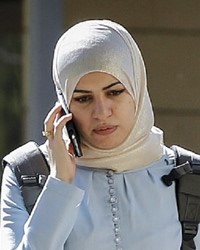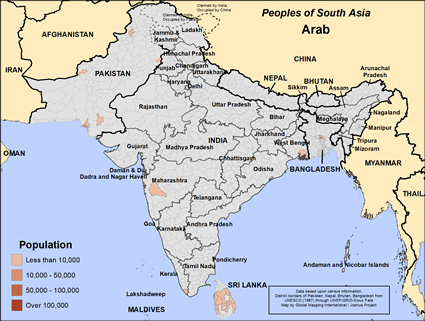The Arabs made their presence known in the 600s when Mohammed and his armies stormed out of the Arabic Peninsula into the Middle East, North Africa and eventually into the Iberian Peninsula of Europe. Arabs went from being mostly desert nomads to becoming the most powerful empire in the West. Their momentum continued until they were repelled at the gates of Vienna, Austria in 1683.
As the Arabs expanded, local peoples became Arabized. This meant they spoke Arabic and identified with Arab culture. A significant characteristic of the Arab Empire was its close association with Islam. Most of these new Arabs became Islamized, though the traditional Christian churches remained in parts of the Middle East such as Lebanon, Jordan and Syria. In the early 21st century Arabic was still the fifth most spoken language worldwide.
Though most Arabic speakers are in North Africa, the Middle East, and especially in the Arabian Peninsula where the language started, there is a large Arab diaspora. In general, those from the Arabian Peninsula are almost entirely Muslim while those from the Levant have a Christian minority. The Levant includes Lebanon, Jordan, Syria, Iraq and Palestine. They speak Levantine Arabic. A disproportionate number of them flee their homelands because of Muslim Arab persecution. Such Arabs live in various parts of Europe such as Austria, Bulgaria, Luxembourg and Monaco. They are represented in Africa in Ethiopia and Egypt and the Latin American countries of Chile, Ecuador, Cuba, El Salvador and Nicaragua.
Monaco is noted for wealth and gambling. Arabs are most likely to go there for an extravagant vacation rather than to live.
The few Diaspora Arabs in Monaco are usually middle class. They have been exposed to Western culture on a grand scale, and their traditional culture and way of life have undergone many changes. As a result, they have experienced much tension. This is especially true for those from the second and third generations, who frequently interface with the host country.
The situation has weakened their traditional Arab family ties. There is greater freedom for women to leave the home, fewer arranged marriages, and less social pressure to conform to traditional religious practices. This is especially true for Christian Arabs who are more likely to marry someone from the host country than a Muslim.
Muslim Arabs in the diaspora preserve cultural traditions such as how they name their children. It is customary for an Arab child's name to reflect the three dominant elements of Arab life: kin, home, and religion. Thus, a boy might have a name such as "Mohammad ibn Ibrahim al Hamza." "Mohammad" represents his religious name. "Ibn Ibrahim" is his father's name. "Al Hamza" means that he is from the village of Hamza. Girls are given similar names, which they keep even after marriage. This reflects the Muslim Arab tradition that even though women are subservient to men, they retain their identities, separate legal rights, and family ties.
Mohammed first preached the tenets of Islam to the Arabs in the 600s. His successors quickly spread the word of Allah far and wide. Wherever Arabs went, they left the Islamic religion. The historical link between Arabs and the Islamic religion is still very strong.
There were places where Islamic Arab armies encountered traditional Christians. They have retained their religion, which often focuses on ethnicity more than Christ. It's difficult to get traditional Christians to put all their faith in Jesus Christ rather than an institution.
Some Diaspora Arabs are traumatized by what they encountered in the old country. Others are facing culture shock; at home, they must be Arab and outside the home they have a different identity. That issue becomes more intense with each generation. They need love and unconditional acceptance by Christians who will love them into Christ's kingdom.
Pray for the Holy Spirit to move in Arab families, drawing them to the throne of grace.
Pray for Arab Muslims to crave the forgiveness and unconditional love of the Lord.
Pray for Arab Muslims to have such a need for spiritual growth that they are willing to embrace Christ no matter what they face.
Pray for Arab disciplers who will disciple others.
Scripture Prayers for the Arab in Monaco.
https://en.wikipedia.org/wiki/Lebanese_diaspora
| Profile Source: Joshua Project |















